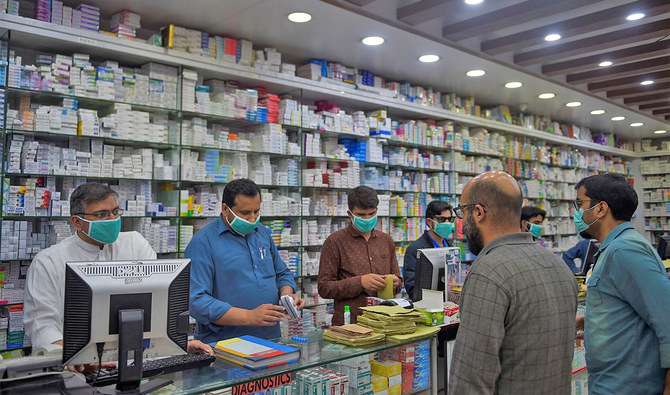KARACHI: Pakistan’s interim health minister Nadeem Jan said on Monday the government had imposed an interim ban on using injections of Avastin cancer drug across the country after a number of patients injected with the drug lost vision.
Some 68 people from various districts of Punjab province have been hospitalized with blindness after receiving injections of Avastin, a medication primarily used for the treatment of cancer patients but also prescribed off-label in Pakistan for diabetic retinopathy-related edema.
Health officials say the medication is registered with the Drug Regulatory Authority of Pakistan (DRAP) for the treatment of colon carcinoma only.
The regulator said in a statement on Monday incidents of “loss of vision in diabetic patients have been reported following treatment with Altered/Dispensed/Diluted Avastin injection.”
DRAP instructed the drug’s importer to recall suspected batches of Avastin 100mg injection, which it said had been created illegally.
“The sale/distribution of registered Avastin Injection has been put on halt till verification of its quality through sampling and laboratory testing to safeguard public health,” DRAP said in a statement on its website.
“We have established a clear strategy in response to this situation,” the health minister told Arab News. “The supply of this medication [in injection form], whether from Roche or Genius pharmaceutical, has been halted, and both Punjab and other provinces have been instructed to cease its sale and purchase until the investigation report is released.”
Jan said a five-member committee had been established to investigate “whether the problem was caused by the medicine itself, issues in its supply chain, the skill level of the administering doctors, or the sterilization process.”
Two people associated with distribution of Genius Pharmaceuticals had been identified, and a First Information Report (FIR) had been filed against them, the minister said:
“Two suspects have been identified and charged, but they have gone underground to evade arrest. They will be apprehended soon.”
The affected patients had used Avastin doses distributed by Genius Pharmaceuticals.
“Once the report is ready, it will be made public, and the culprits will be dealt with according to the law. They will be punished, setting an example for others and deterring them from committing such acts driven by self-greed,” Jan added.
On its website, Roche said Avastin was approved in more than 130 countries, including the United States, to treat several types of cancer. Roche’s Pakistan has not yet commented.
Avastin was used as an eye treatment off-label, meaning outside of the approved use. Cancer drug Avastin, when used at much lower doses, is similar to eye drug Lucentis, and is used in many countries as a low-cost option to treat certain blindness-causing conditions.
Speaking to Arab News, Javed Akram, Punjab’s Minister for Specialized Health, said the injections seemed to be okay when they were dispatched from the company but problems likely arose when they were converted into smaller doses.
“It is being transferred into small syringes from large vials for cost-cutting and profit-making, which goes against good clinical practices,” Akram said, adding that the technical committee would determine the real cause.
Akram said a majority of the affected patients from central Punjab had been admitted to Mayo Hospital, Lahore, while those from the province’s southern districts had been shifted to Nishtar Hospital, Multan.
Jan said the government had instructed provincial authorities to ensure patients received free and high-quality treatment.
“Eighty percent of the patients show improvement with proper treatment. The government is committed to ensuring the full recovery of all patients,” he said, adding that though the cases had so far only occurred in Punjab, other provinces had also been adviced to suspend the use of this medication for two weeks as a precaution.



















